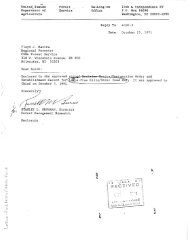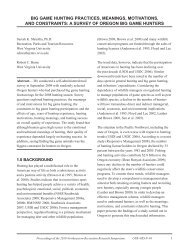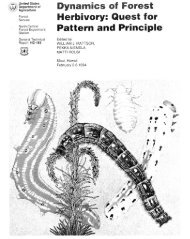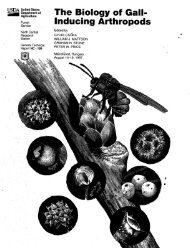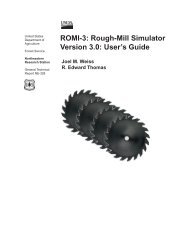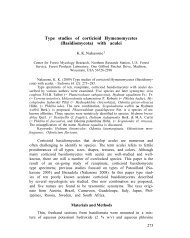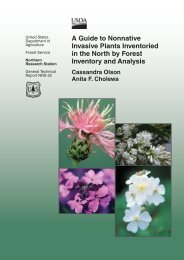Proceedings of the 2009 northeastern recreation research symposium
Proceedings of the 2009 northeastern recreation research symposium
Proceedings of the 2009 northeastern recreation research symposium
You also want an ePaper? Increase the reach of your titles
YUMPU automatically turns print PDFs into web optimized ePapers that Google loves.
time/fi nances” in dune protection. Th e most frequently<br />
mentioned physical on-site infl uence was designated trails<br />
and walkways. One female nonresident indicated that<br />
string fencing, a psychological barrier used throughout<br />
<strong>the</strong> ELODWA, infl uenced her decision to stay out <strong>of</strong> <strong>the</strong><br />
dunes.<br />
#45 (female visitor): I stay on <strong>the</strong> little paths that<br />
<strong>the</strong>y rope <strong>of</strong>f and stuff like that.<br />
Interviewees frequently mentioned that observing <strong>the</strong><br />
past degradation <strong>of</strong> <strong>the</strong> dune system and its restoration<br />
over <strong>the</strong> past 20 years had infl uenced <strong>the</strong>ir actions in <strong>the</strong><br />
ELODWA. One female resident described some <strong>of</strong> <strong>the</strong><br />
changes that she has observed in <strong>the</strong> ecosystem.<br />
#22 (female resident): “I came here when I was<br />
a little girl and <strong>the</strong>re are no dunes like <strong>the</strong>y used<br />
to be. Th ey used to be 40 feet in <strong>the</strong> air and<br />
everything. And just <strong>the</strong> erosion, <strong>the</strong> wind, and<br />
people trampling over <strong>the</strong>m has all worn <strong>the</strong>m<br />
down. And that’s [staying <strong>of</strong>f <strong>the</strong> dunes] what’s<br />
gonna keep it that <strong>the</strong> pond stays <strong>the</strong> pond [in<br />
o<strong>the</strong>r words, that’s what will prevent sand from<br />
infi ltrating <strong>the</strong> pond behind <strong>the</strong> dunes].”<br />
Socialization related to a natural-resource protective ethic<br />
was also identifi ed as infl uencing stewardship actions.<br />
Th e concept <strong>of</strong> “it’s <strong>the</strong> way I was brought up” was<br />
mentioned by six interviewees, and is summarized by <strong>the</strong><br />
following quote.<br />
#43 (female resident): I think when I was little, my<br />
mom and dad had said not to do that, and <strong>the</strong>n I<br />
just didn’t have any interest in climbing <strong>the</strong>m and<br />
touching <strong>the</strong>m [i.e., <strong>the</strong> dunes].<br />
Ten interviewees mentioned <strong>the</strong> benefi t <strong>of</strong> <strong>the</strong> dune<br />
system for <strong>the</strong> interviewee and/or his/her family in<br />
general. Th ey indicated that <strong>the</strong> use <strong>of</strong> <strong>the</strong> area by <strong>the</strong>ir<br />
children and grandchildren, or <strong>the</strong>mselves, infl uenced<br />
<strong>the</strong>ir desire to protect <strong>the</strong> area.<br />
Ten participants also mentioned personal investment <strong>of</strong><br />
time or fi nancial resources for dune restoration. Nine<br />
interviewees specifi cally referred to <strong>the</strong>ir involvement in a<br />
nongovernmental organization related to natural resource<br />
management or protection in general.<br />
<strong>Proceedings</strong> <strong>of</strong> <strong>the</strong> <strong>2009</strong> Nor<strong>the</strong>astern Recreation Research Symposium GTR-NRS-P-66<br />
#22 (female resident): I’ve been to <strong>the</strong> meeting for<br />
<strong>the</strong> new water thing that <strong>the</strong>y’re having for <strong>the</strong> lake<br />
levels and all <strong>of</strong> that; I’ve been to that meeting. I try<br />
to get involved in <strong>the</strong> town <strong>of</strong> Sandy Creek because<br />
that’s <strong>the</strong> town that this is in…to see what’s going<br />
on. I belong to <strong>the</strong> sportsmen’s club. I haven’t joined<br />
<strong>the</strong> people for <strong>the</strong> bird sanctuaries, and actually<br />
taking care <strong>of</strong> <strong>the</strong> dunes but… Now I’m retired and<br />
I’m up here full- time so…we’ll see what next year<br />
brings. I like to get involved!<br />
Fewer than 10 interviewees mentioned three sub<strong>the</strong>mes:<br />
regulatory infl uences, benefi ts <strong>of</strong> <strong>the</strong> resource for society,<br />
and knowledge <strong>of</strong> <strong>the</strong> resource base. Regulations and <strong>the</strong><br />
enforcement <strong>of</strong> regulations concerning dune use were<br />
mentioned by only four interviewees, as were benefi ts <strong>of</strong><br />
<strong>the</strong> resource for society in general (e.g., benefi ts for future<br />
generations in general were mentioned). Knowledge <strong>of</strong><br />
<strong>the</strong> resource base included concepts related to an in-depth<br />
understanding <strong>of</strong> fl ora and fauna on-site or <strong>of</strong> <strong>the</strong> process<br />
<strong>of</strong> dune erosion.<br />
3.3.3 Stewardship development over time<br />
Interviewees were asked “Did you feel that protecting<br />
<strong>the</strong> dunes from erosion was important during your fi rst<br />
visit, or is it something that developed over time?” Two<br />
sub<strong>the</strong>mes emerged through analysis. More than half<br />
(31) <strong>of</strong> <strong>the</strong> interviewees mentioned <strong>the</strong> fi rst sub<strong>the</strong>me,<br />
“incremental changes in perceptions about stewardship<br />
over time.” One male nonresident described <strong>the</strong><br />
stewardship ethic that developed in him through <strong>the</strong><br />
interpretive signs’ consistent message:<br />
#26 (male visitor): It basically developed over time.<br />
Seeing a sign every time and staying <strong>of</strong>f it [i.e., <strong>the</strong><br />
dunes].<br />
Many interviewees also indicated that <strong>the</strong>ir protective<br />
ethic had developed as <strong>the</strong>y aged.<br />
#43 (female resident): Developed over time. I didn’t<br />
really have a sense in that when I was younger.<br />
116





